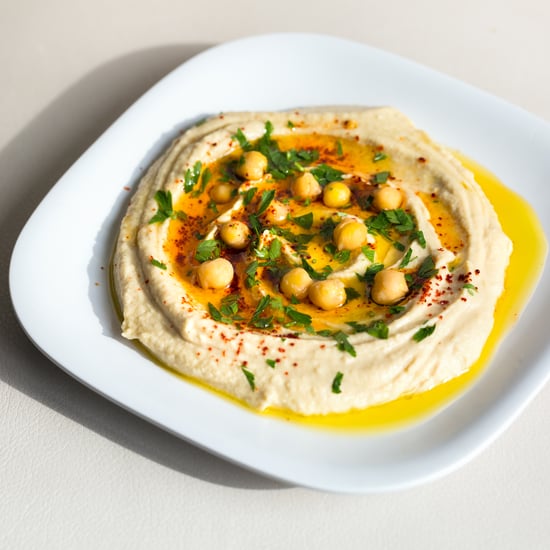What Happens When You Eat Too Fast?
Eating Too Fast Can Seriously Mess Up Your Body — Here Are Some Tips to Slow It All Down

We're not talking about entering a hot dog eating contest. If you're downing your food at your office desk or on your commute to the office without taking time to register what you're actually eating, you're eating way too fast, and you could be putting your body in jeopardy. Speed eating might look like cleaning your plate in under four minutes (roughly), says Maggie Michalczyk, RD, a Chicago-based registered dietitian and ambassador of A Sweat Life, to POPSUGAR. It turns out, shovelling your food is actually super bad for you, so here's what can happen if you keep doing it regularly, without taking time to sit down and enjoy a meal.
You Get Pissy
Eating too fast can lead to some serious mood swings. "I know after a workout when I'm not hitting that important refuelling window of 30 to 60 minutes post-workout to eat something, I start feeling that all-too-familiar 'don't talk to me cause I might bite your head off' feeling! Speed eating through that meal can lead to these same feelings because, again, your brain and body are not fully satisfied, so you might still feel that brain fog that you were feeling from extreme hunger," Michalczyk said. "I definitely can't concentrate when that happens and always end up having to eat something more to keep from still feeling famished."
Your Tummy Might Hurt
"Because the food is passing through your intestines so quickly, they might not be able to keep up, and the air mixed with the food can cause bloating, cramping, and diarrhoea or vomiting in some cases," she said. "Indigestion is super common because your stomach is working hard but simply cannot keep up at that pace. So either your reflexive mechanisms will want the food to come back up, or your osmotic forces will force water into your gut to get it out the other way."
You Might Overeat
If you are eating too quickly, you're not able to take note of what you're eating, so you can take in more food than you'd like. "It can lead to overeating and weight gain because you aren't giving your body the time for natural satiety cues to kick in," explained Maggie Moon, MS, RD, and author of The MIND Diet, to POPSUGAR. If you're eating too many calories because you can't register fullness in the body, you can also gain weight over time. (More calories, more weight.)
Your Metabolism Might Suffer
If you're eating too fast, you're adding stress to your body and changing its natural metabolism. "You're adding stress to the body's digestive system by giving it a large amount of food at once to process," Moon said. "Mitochondria are not built to process that much food at once, and it leads to a backlog of work (aka food) to work through, messing with normal metabolism."
"It takes about 20 minutes for those natural feedback mechanisms to kick in (basically when you start feeling that full feeling at one point in the meal). When you bypass that process by eating at the pace of a racetrack, the feedback mechanism to your brain is compromised, so you're left feeling hungry still despite the plateful you might have had," Michalczyk added.
A Few Tips to Slow Down
"Put your fork down between bites, and take time to look around you, or make eye contact and conversation with your dining guest," Moon said. "Choose foods with natural speed bumps that slow down eating such as in-shell pistachios and foods you have to chew versus sip, such as a whole apple versus a smoothie with an apple in it."
Also, sit down. Don't stand and eat. Don't hang out in the kitchen. "You're in too close of range, making it too easy to snatch up something else to eat because you've eaten all of your other food too fast! Get out of the kitchen, sit down, look at your food, breathe, take bites, chew, and allow yourself to connect with the moment of nourishment and act of eating," Michalczyk said. Plus, stash your phone, which can be a distraction, she said.
Lastly, drink plenty of water, which will fill you up and slow you down. "Drink a glass of water (about 8 oz.) before you start eating. Oftentimes when we think we are hungry, we are in fact dehydrated. Gulping water before diving in will prime the stomach and offset some of those hunger pains, starting the filling process and helping us to eat slower because the stomach is already getting fuller," Michalczyk said.







